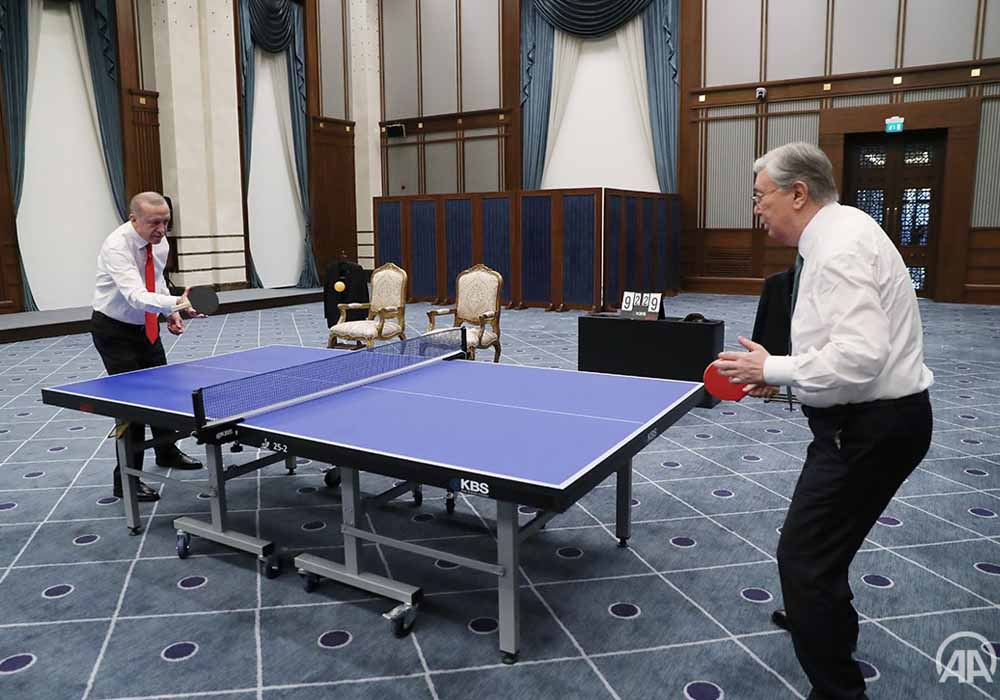This past week, the President of Kazakhstan visited Turkey to discuss bilateral trade, Uzbekistan and Turkmenistan made plans for manufacturing coordination and supply chain management along their shared trade route to Europe, activists in Kazakhstan were jailed for an ‘unsanctioned’ rally demanding the release of political prisoners, and an activist group in Kazakhstan announces the launch of a political party that seeks to aid Kazakhs in Xinjiang.

Image source: Anadolu Agency
Kazakh President Tokayev visited Turkey, emphasizing the importance of trade routes bypassing Russia (RFE/RL, Eurasianet). The two countries’ Presidents agreed to boost bilateral trade and widen trade corridors that allow bypassing Russia, such as those going through Turkey or Azerbaijan from China. The war in Ukraine was also discussed, but did not explicitly get featured in the Kazakh side's minutes of the talks. The two (and most other Central Asian) countries share a common heritage as Turkic people. Furthermore, Turkey was among the first to recognize Kazakhstan’s independence from the USSR and played a heavy role in its nation-building and economic restructuring efforts in the 1990s. This visit seems to play into this image, as Kazakhstan tries to navigate a political tightrope between salvaging its economy from the impact of anti-Russian sanctions and not angering its northern ally.
Uzbekistan and Turkmenistan discussed cooperation in supply chains and manufacturing (SRB). The two countries discussed increasing bilateral cooperation in manufacturing and supply chain management along the Europe-Central Asia-China supply chain and manufacturing corridor. Both countries are feeling the fallout of the war in Ukraine as the ruble fluctuates, and many Uzbek and Turkmen emigrants lose their paychecks in Russia. A common trend seen in central Asia seems to be to offset the economic impact of the sanctions against Russia by deepening local trade relations and rebalancing towards China.
Eight Kazakhstani activists were jailed for participating in a public demonstration demanding the release of political prisoners (RFE/RL). The eight were sentenced to between 15 and 20 days in jail. The demonstration in which they attended was held to demand the immediate release of hundreds of political prisoners who were detained after the January protests. The protests are a touchy subject for the Kazakh government and public displays of discontent about the handling of the protests are hushed. In the immediate aftermath of the protests and the subsequent crackdown, it was reported that people possessing even so much as footage of the events were detained and/or beaten.
In other news, a political party is set up in Kazakhstan by an activist group defending the rights of Kazakhs in Xinjiang (RFE/RL). The group, called “Naghyz Atazhurt” (Real Fatherland) announced the formation of the party on May 12th in Almaty, the country’s largest city. According to the group’s leader, Bekzat Maksutuly, they were disillusioned by the Kazakh government’s troops firing on unarmed protesters in January and that “[They] understood that the problems faced by ethnic Kazakhs abroad cannot be resolved unless real legal institutions, rule of law and justice, are established in Kazakhstan." Kazakhstani authorities are notably silent on the repression of their kinsmen across the border in Xinjiang, likely prioritizing their economic relations with China over moral qualms over the alleged genocide. The creation of a party that is vocal about the issues faced by Kazakhs in China has the potential to increase the general public’s awareness of the matter.

